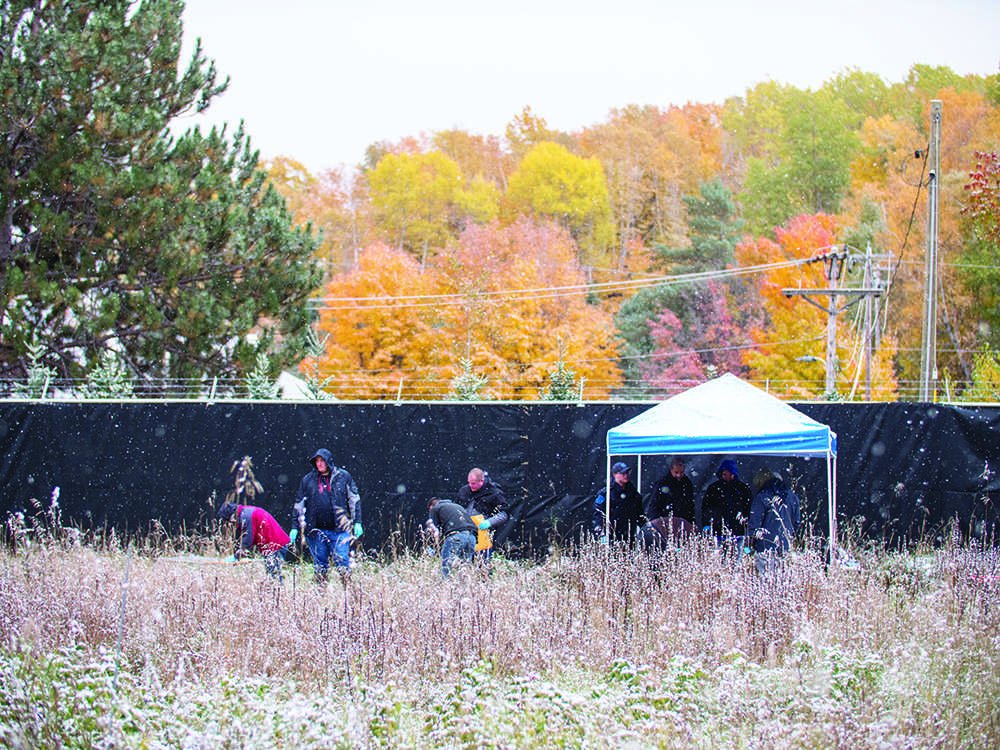The Forensic Research Outdoor Station (FROST) at NMU continues to connect with the campus community; this time, with law-enforcement training led by Jane Wankmiller, director of FROST.
Every year, the NMU Public Safety Institute (PSI) and Michigan State Police (MSP) host either an intensive two-week Evidence Technician Training or a series of two-day refresher lessons. In the training, law enforcement personnel from agencies across the U.P. learn how to document crime scenes and collect evidence so it can be sent to the crime lab for analysis, Wankmiller said.
In the refresher trainings, they review topics taught in the two-week course and devote some time to a special topic. This year, a refresher year, the special topic involved FROST and the Forensic Anthropology Research Laboratory (FARL).
Wankmiller and her team provided access to the outdoor facility, where the officers worked through some evidence collection involving donors. While they were in the lab, they went through several stations: human/non-human identification, human skeletal anatomy, photography, trace evidence collection and some field testing methods.
“It was a great cooperation between the MSP, PSI, FROST and FARL,” Wankmiller said.
The NMU PSI funded the training, and Wankmiller said she was happy to put on the training. She said it was a great opportunity for FROST to work with another NMU department and to provide training to law enforcement, which is part of NMU’s mission.
“The people who directly benefit from this training are the officers and their agencies, but any training they receive ends up benefiting the broader community because it helps them solve crimes,” Wankmiller said.
The training didn’t involve many students, but two were able to work directly with the officers.
“I enjoyed being able to interact with law enforcement from across the U.P. and see this activity that we had hoped would happen when we were planning FROST come to fruition,” Beth Roberts, post-baccalaureate nursing student said. “Law enforcement training was one of the big components of FROST that we wanted to include, and I’m happy that it’s already starting.”
Roberts assisted in the creation of the “FROST” acronym and currently helps with data collection, supply stocking, cleaning and processing donors when researchers are done working with them in the field. She also helps with supply ordering, supervising undergraduate students and helping with departmental affairs.
“I’m so happy to have seen this program through from its idea phase to now and to still be working on it,” Roberts said. “I will have this experience as part of my background for the rest of my life. I learn something new every day.”
The projects that Roberts were involved in were a PowerPoint presentation for the trainees to view that showed X-rays of antemortem and postmortem images of three cases for them to learn alternative ways to identify victims; age and sex identification of a skeleton as well as unique bone features; and a “human or not?” bone quiz station that included human, animal and non-animal specimens for participants to try and identify and learn from,
Roberts said.
Future training will involve more students, that would involve search and recovery, the recovery of a surface scatter of bones that would involve plastic skeletons, Wankmiller said.
“That training will involve a larger number of students who, again, will have the chance to interact with the law enforcement community and learn skills that they can apply in future trainings or their future careers,” Wankmiller said.
Currently, FROST has five total donors from Western Michigan University’s Stryker Medical School, and it received its first local donor recently, Roberts said.
“Our most interesting observations have been the rate of decomposition over the summer; it did not take the trajectory we expected, but there are several factors that could have affected this,” Roberts said. “We are looking forward to seeing what happens with our next round of donors.”
“It was a good way for them to learn both the technical skills and also learn a few new skills. They seemed to really enjoy seeing our specimens and being able to inspect human and non-human bones,” Roberts said. “Hopefully their new skills will help them when it comes time.”
Future training will involve more students, that would involve search and recovery, the recovery of a surface scatter of bones that would involve plastic skeletons,
Wankmiller said.
“That training will involve a larger number of students who, again, will have the chance to interact with the law enforcement community and learn skills that they can apply in future trainings or their future careers,”
Wankmiller said.
Currently, FROST has five total donors from Western Michigan University’s Stryker Medical School, and it received its first local donor recently, Roberts said.
“Our most interesting observations have been the rate of decomposition over the summer; it did not take the trajectory we expected, but there are several factors that could have affected this,” Roberts said. “We are looking forward to seeing what happens with our next round of donors.”




























